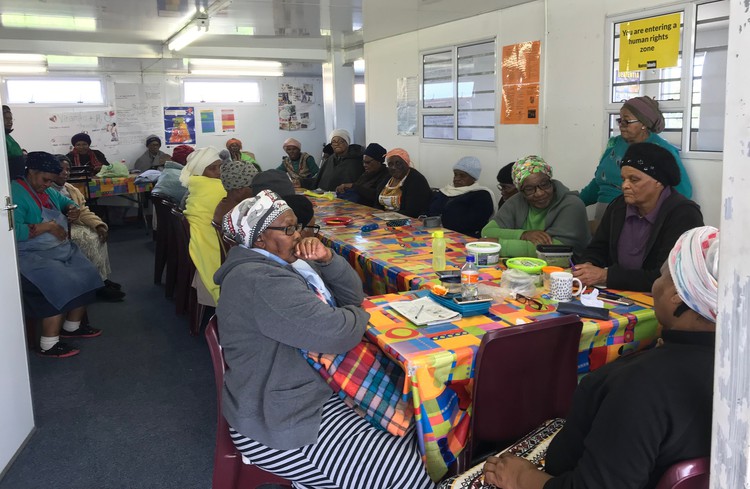Western Cape seniors taste benefits of Ikamva Labantu clubs
Confidence returns as elderly enjoy activities, company and affirmation
Non profit organisation Ikamva Labantu told GroundUp on Thursday it had intensified its awareness campaign raising issues that affect elderly people in townships in the Western Cape.
The organisation was founded in 1960 by Helen Lieberman and other women activists to fight the conditions of apartheid by setting up initiatives for childhood development, disability care, foster homes, shelters and elderly care.
Today, Ikamva Labantu works with about 800 seniors who are members of 22 clubs in areas like Gugulethu, Langa, Kalkfontein, Fish Hoek and Dunoon. A bus picks them up each week day at 9am and drops them off at 3pm.
The club members are 55 and older. At the club they do exercises, are supervised in taking their chronic medication and get their blood pressure checked. They also get two meals.
The seniors get books from the library, read and do storytelling with youths. They also make bags from recycled material and hats from recycled Shoprite plastic bags.
“The items are popular with tourists and, when they are sold, a portion goes to the club and the rest to the person who made the item,” said the head of Ikamva Labantu’s seniors programme, Lulama Sigasana.
In an interview at Masincediswe senior club in Khayelitsha, Sigasana said the whole family was a focus in awareness campaigns because there is a tendency to think that when a person is older or bedridden they don’t matter. There is concern about the abuse of seniors’ grants.
Sigasana said the reason why people abused seniors varied but they saw cases involving poverty, unemployment, the impact of HIV and the migration of people from rural areas to the city.
“When our staff members do home visits they witness all forms of abuse and negligence,” she said.
Lieberman, the organisation’s founder, said: “Senior citizens are the most valuable possessions. They have the history, culture, they are mature, they are open, honest and have nothing to hide. When you come from spending an hour with them you see the world in a different way.”
She said seniors worked very hard when they were young but were never properly remunerated. Today they are not acknowledged for what they did to build the country.
“They spend hours waiting for medication in queues. They don’t have savings, they get a state pension, which is nothing, and [yet they] still feed families,” she said.
Ikamva Labantu also has counselling because many of the seniors are dealing with old traumas that were never acknowledged.
A 76-year-old woman said she joined the Masincediswe club in 2006. She worked as a domestic worker in Bellville and used her savings to renovate her house when she retired in 2005. She lives on a pension grant. “I am very happy at the club. If I stay home I get lonely and depressed.”
She lives in an RDP house with her three grandchildren.
Her son who dropped out of school in grade ten has been a constant trouble to her. She said he used to take drugs and sell them in her home, and also stole from her. When she was out, he brought around friends who partied and left the house in a terrible state.
Fearing for her life she moved out and went to stay with her daughter. Earlier this year she heard from neighbours that the son had abandoned the house, so she moved back. But she is worried because he disappeared and she has not been able to find him.
“I don’t have peace. I am in pain. I would love to know what happened to my son,” she said.
Another elderly woman said her son’s girlfriend came to her house about ten years ago and dumped two children. The youngest was two. The children had no warm clothes, satchels, or shoes for creche. She had nothing to put in their lunch boxes.
With her first pension money she bought shoes and satchels for the children. When the children were in primary school, it was a constant struggle to find money for their uniforms and school fees. The children’s mother allegedly collected child grant money but spent it on herself. She also refused to hand over her children’s birth certificates.
The woman lives in an RDP house. She worked as a domestic worker for various people in Pinelands from 1965 to 2003. She said when she retired she didn’t get retirement benefits.
She was married but her husband left her when the first child, now a 38-year-old man, was just three. She raised and educated her three children alone.
“I am happy here. I have gained confidence and my life is progressing positively. I participate in sports and I am the club’s representative. I sit in all the conferences,” she said.
Assistant at Masincediswe Club, Kholeka Husithi, said she recruited the seniors. She started with 50 but the number has dropped to 38 because some of the seniors had relocated, some had died and others were now homebound. There are only two men among the 38.
Husithi said the men did not want to spend the whole day at the club, “they only want to come for a few hours”.
Support independent journalism
Donate using Payfast

Don't miss out on the latest news
We respect your privacy, and promise we won't spam you.
Next: Mother gave up her sick child because she lives in a shack without services
Previous: Health workers sit in at PE clinic following attack on nurse
© 2019 GroundUp.
This article is licensed under a Creative Commons Attribution-NoDerivatives 4.0 International License.
You may republish this article, so long as you credit the authors and GroundUp, and do not change the text. Please include a link back to the original article.

